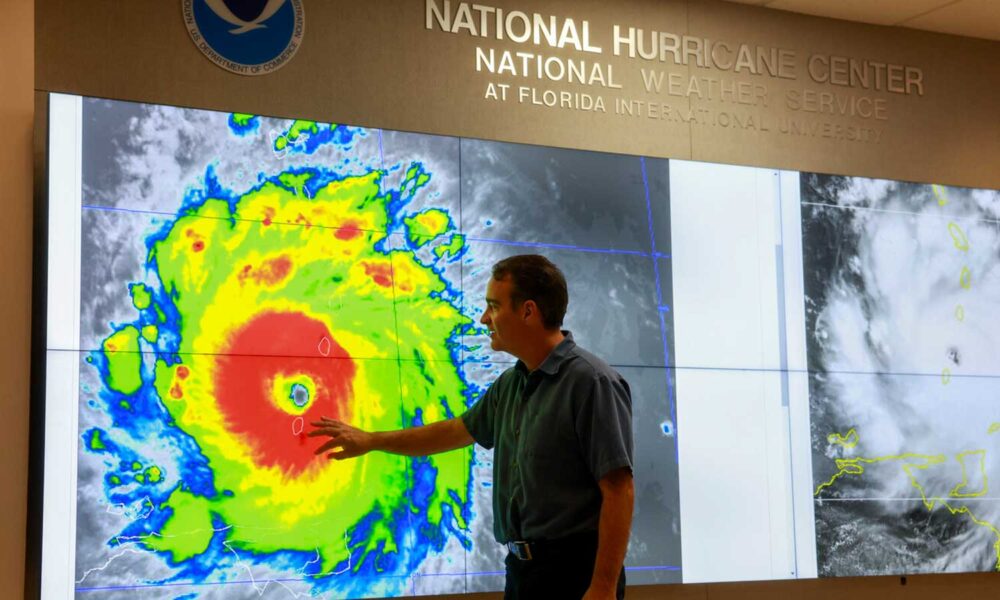According to a leaked internal budget memo, the Trump Administration is planning to end climate research at both the National Oceanic and Atmospheric Administration (NOAA) and the National Aeronautics and Space Administration (NASA). If this goes ahead, it would be an illegal escalation by the Trump Administration against the United States’ scientific enterprise and will directly hurt American livelihoods, leading to more deaths and greater economic damage from extreme weather events. Congress holds the power of the purse in our democracy and should step up to oppose harmful cuts to NOAA and NASA.
While the proposed cuts claim to only be directed at climate change research, which would be disastrous on its own, the scientific institutions on the chopping block are imperative for the prediction and research of extreme weather events, including tornadoes, hurricanes, and floods. The memo proposes closing all 16 Cooperative Research Institutes in 33 states, every one of the 10 research labs, all 6 regional climate centers, slashing the budget for the NASA Goddard Space Institute, and ending $70 million in grants to research universities. Thousands of seasoned scientists, early career scientists, and young scientists in graduate schools will lose funding. These folks have spent their livelihoods conducting research that improves climate and weather prediction that directly affects every American.
But what does this mean? Why should you care? Here are just some examples of how these cuts will affect you, if they go ahead:
1. Significant decrease in hurricane forecasting accuracy
The proposed cuts include closing the Cooperative Institute for Marine and Atmospheric Sciences (CIMAS) at the University of Miami and the Atlantic Oceanographic and Meteorological Laboratory (AOML). This would end support for NOAA’s hurricane hunter missions as we know them, which provide invaluable data for hurricane forecasting models that predict the path and strength of hurricanes making landfall in the United States. Further, improvements in hurricane forecasting by these institutions have led to nearly $5 billion saved per major US-landfalling hurricane. The total budget cuts that would close these institutions? $485 million. These 2 institutions alone save the American taxpayer tens of billions of dollars annually, far more than what they cost. Closing them makes zero financial sense, and will cost us dearly, including in lives.
2. An end to climate monitoring for farmers
If this budget passes, the NOAA Regional Climate Centers (RCC) would shut down operations, which provide critical decision tools for farming communities across the United States. This includes products that factor long-term climate data into decisions for frost, drought, extreme precipitation, and even turf grass for golf courses. The RCCs further archive weather and climate data that are used for understanding trends in temperature and precipitation extremes.
3. Coastal communities will be left on their own
The memo calls for a slashing of the budget that supports the National Ocean Service, which provides information on tides, flood risk from extreme weather events, sea-level rise due to climate change, and water pollution for coastal communities.
4. An end to US climate science leadership
The proposed budget would close the Geophysical Fluid Dynamics Laboratory (GFDL) in Princeton, New Jersey, which is the birthplace of weather and climate modeling. If this occurs, the US would be abdicating its leadership in the advancement of our understanding of the atmosphere, especially under climate change. If we can no longer predict the effects of climate change, communities in the United States will be left on their own, with no help in how they should adapt to changes in extreme weather events.
5. Young scientists under threat with nowhere to go
Graduate students and early career scientists across the country depend on funding from NOAA grants and Cooperative Institutes to conduct their research. These projects are vital for the future of the US economy and include anything from predicting tornado outbreaks using machine learning to studying how hurricanes undergo rapid intensification. If this funding is cut, we lose the ability to fund these projects that benefit every American, and we lose the ability to support curious young scientists who want to better the world with research. Furthermore, international graduate students and professors across the country are fearful of having their visas revoked due to small administrative errors or by exercising freedom of speech as is protected under the US constitution. In order for the US to attract the world’s brightest minds, we must be creating a space for scientists to flourish in, rather than causing panic and spreading fear through deportations.
On a personal note, my path to getting a PhD would not have been possible had these cuts been made previously. My undergraduate and master’s research was funded by the Northeast Regional Climate Center, where I conducted research on drought risk in the Northeastern United States and applied a statistical model to weather model forecasts for improved predictions of temperature and precipitation. And now, friends in the field who are just leaving graduate school are struggling to find jobs and worried about anything that’s federally funded. Scientists should feel safe and secure in their curiosity of the climate and weather system; that’s how it always used to be in the United States.
The American scientific enterprise is under attack and being sabotaged by the Trump Administration. This is not about making the government more efficient, as it will drastically affect our ability to predict and research extreme weather events, which will have devastating effects on our country’s economy.
It is critical that we stand up and fight for these institutions at this crucial moment. We must contact our representatives and name how these institutions, which we’ve been investing in for decades, benefit our livelihoods. Luckily, we’ve seen some US Representatives stepping up: here is a letter organized by Representative Wesley Bell, press releases from Representative Tonko and Senator Cantwell, and a letter organized by UCS and signed by 2,500 scientists calling on US Commerce Secretary Howard Lutnick to protect the work of NOAA.

